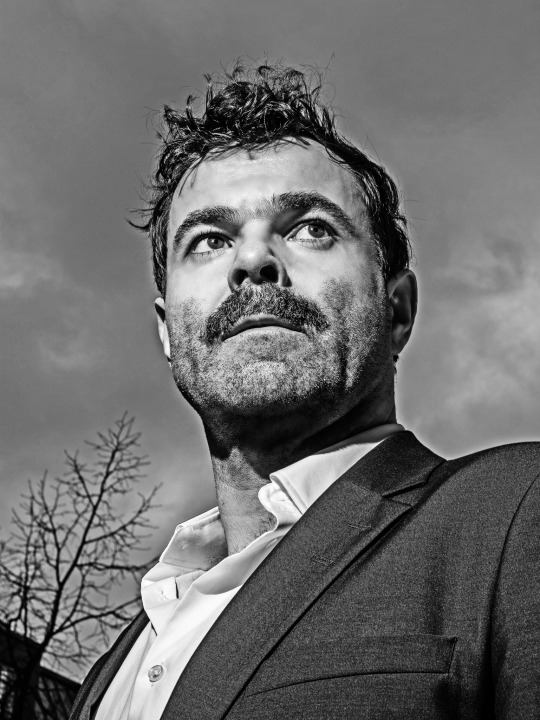#Andreas Döhler
Text
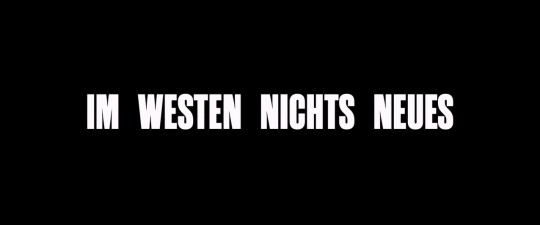





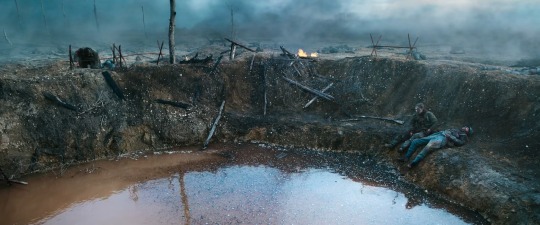


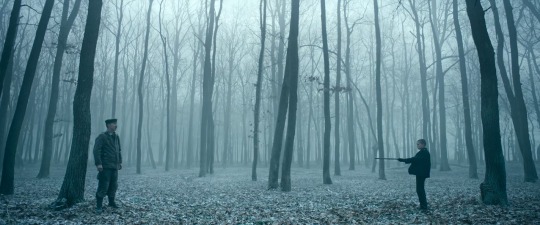
All Quiet on the Western Front (2022)
Director - Edward Berger, Cinematography - James Friend
"What is a soldier without war?"
#scenesandscreens#all quiet on the western front#Im Westen nichts Neues#edward berger#james friend#felix kammerer#albrecht schuch#aaron hilmer#moritz klaus#adrian grünewald#edin hasanovic#daniel brühl#Thibault de Montalembert#devid striesow#Andreas Döhler#sebastian hülk
254 notes
·
View notes
Text
If I had a nickle every time Andreas Döhler played a role in Tatort/Polizeiruf this year... well I wouldn't be rich but it's weird that it happens so often


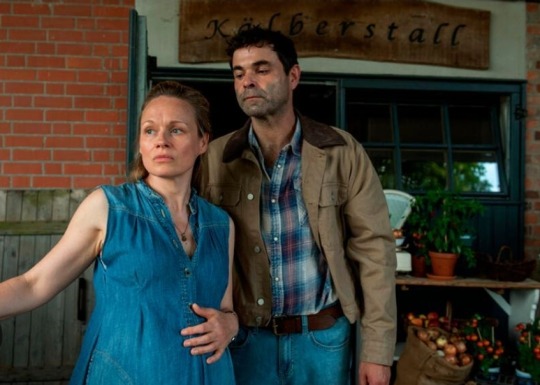
1. Aus dem Dunkel (Tatort Mainz)
2. Cottbus Kopflos (Polizeiruf Frankfurt Oder)
3. Borowski und das unschuldige Kind von Wacken (Tatort Kiel)
#ich seh den Mann gefühlt öfter als manche Freunde#Andreas Döhler#tatort kiel#polizeiruf świecko#tatort mainz#tatort
20 notes
·
View notes
Text
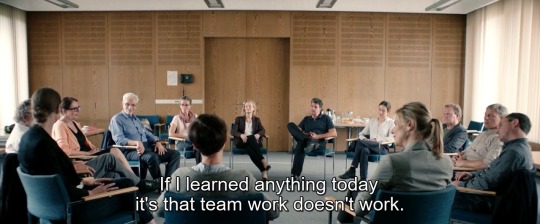
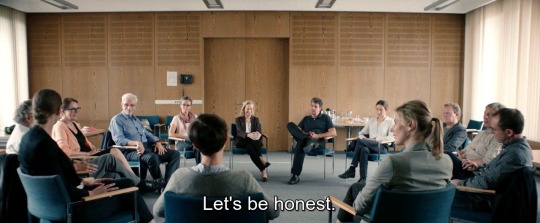
Alles ist gut [All Is Well] (Eva Trobisch, 2018)
#Alles ist gut#All Is Well#Eva Trobisch#2010s cinema#German movies#Europe#Aenne Schwarz#Andreas Döhler#Hans Löw#Tilo Nest#abortion#trauma#women#relationship#assualt#abuse#suffering#drama#female filmmaker#emotions#Deutschland#München#Bayern#Bavaria#European movies#contemporary German cinema#European society#life#women's rights#violence
2 notes
·
View notes
Text

Andreas Döhler (Maximilian, The Duke in Bavaria) and Jördis Triebel (Ludovika, The Duchess in Bavaria) behind the scenes of The Empress (2022).
#the empress (2022)#the empress#die kaiserin#costume drama#historical drama#period drama#andreas döhler#jördis triebel#maximilian in bavaria#ludovika in bavaria#ludovika of bavaria#german series#german tv#behind the scenes#netflix
7 notes
·
View notes
Text
King of Stonks

King of Stonks [trailer]
Series inspired by real events in the financial world, centers on narcissism, megalomania and double standards.
While it's not essential, it's probably helpful if one is familiar with the broad outlines of the story this is based on, the spectacular Wirecard fraud. Sure, events are (slightly) exaggerated. But at the core a lot of things happened as they are shown here. The outside egos, the porn websites roots, Austrian secret service connections, fake Asian payment processor, financial market watchdogs protecting the criminals. To know that heightens the fun and is a reminder that despite seeming totally outlandish, it is indeed based on real events.
The two leads are ideally cast. My main complaint, as it's often the case, the mini-series has two episodes two many. The momentum gets lost, and there's one repetitive story circle too many. Though the ending is okay.
And as a reminder, while looking back everyone wonders how something this insane could've had happened. These frauds happen on a regular basis, the latest variation happened in the form of FTX. Multiple TV series, documentaries and movies are probably already in the making.
#King of Stonks#Matthias Murmann#Philipp Kässbohrer#Matthias Brandt#Thomas Schubert#Larissa Sirah Herden#Sophia Burtscher#Andreas Döhler#Altine Emini#Jean Luc Bubert#Bibiana Beglau#Eva Löbau#Joachim Król#foreign#Germany#like#recommended#TV
2 notes
·
View notes
Text
All Quiet on the Western Front (2022, dir. Edward Berger) - review by Rookie-Critic
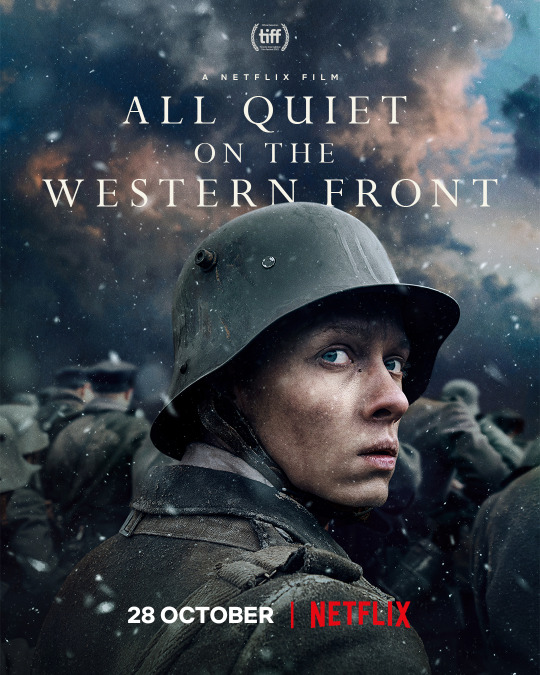
Showing the atrocities of war is always a tightrope walk. You want to show how brutal it is, you want to show people that this thing, this behemoth that has overtaken the world more times than can ever be counted, is horrid and should be avoided if at all possible, but you don't want to desensitize, you don't want to present it so fast, so hard, so unprofoundly nihilistic that it loses its meaning. You don't want to numb people to the pain or push your messaging past its limit, to make the term "war is hell" into a parody of itself. While there were a lot of things I really liked about Netflix and Edward Berger's remake of All Quiet on the Western Front, I feel like this is its biggest issue.
It revels in its "more is more" approach to showing how horrible the Western front lines of the first World War were and it causes the immersion to break and it cheapens the film's very real and very potent anti-war sentiment. The anti-war film is nothing new, we've seen this song dance a million times before, made extremely evident by the fact that this is a remake of the world's first significant anti-war film by the same name, which came out in 1930, 94 years prior to its successor. We've had close to a century of powerful, magnetic, devastating anti-war stories: from Chaplin's The Great Dictator to Kubrick's Paths of Glory AND Full Metal Jacket AND Dr. Strangelove to The Deer Hunter to Apocalypse Now to Das Boot, Platoon, Grave of the Fireflies, 1917, Jojo Rabbit, and on, and on, and on. We get the song, we get the dance, it is a very important message, but we no longer need it spoon-fed to us. The unfortunate thing about the new Western Front is that its images and iconography are intensely powerful and very profound, they get there and they do it fabulously, but then they don't stop. Every scene has an element to it that feels superfluous, that feels like they're bashing your head against the wall that says "war is hell" and screaming at you "DON'T YOU GET IT?!" The answer is, yes, I do, I got it, and I would have without a lot of the, for lack of a better term, extra that's here.
To lay out my point with an example from the film, and don't worry it's not really going to spoil anything (although if you really don't want to know then you should just skip ahead to the next paragraph), but there's a scene in the film involving the general who is in charge of our protagonist's regiment. This immediately follows what is possibly the most intense and brutal sequence in the entire film (which, again, outside of a handful of superfluous elements, is really quite a powerful sequence), and the film juxtaposes all the horror we just witnessed with this general, sitting safely in a very large dining room, eating a feast with a direct subordinate. We get extreme closes ups of everything on the table: olives, fresh bread, a whole leg of lamb, wine, which he drinks a few sips of then tosses the rest on the floor and asks for more. He does this thing with the wine several times throughout the scene. He asks his subordinate about his life back home and what he will return to once the war is over and the subordinate tells him about his family's riding saddle manufacturing/selling business. The subordinate asks the same question to the general and the general goes on a tangent about how he is a soldier who was born in the wrong time because, before this current war, his whole life had been peaceful. He says "what is a soldier without war?" Then tosses what looks like more than half of the meat on his plate to the dog sitting on the floor. This scene would be so infuriatingly impactful and meaningful if the film didn't insist on shoving the message down our throats. I didn't need close ups of the food, I didn't need the spectacle of watching him deliberately waste food and drink, I didn't need this man's hypocrisy slammed into my eyeballs a thousand times over. The atrocious nature of the scenario lies in the scenario itself! Just cut to this horrible man eating his clearly excessive meal in safe quarters after we just watched a lot of men that he is responsible for get brutally mowed down for nothing; no close-ups of the food, no excessive food waste, just the scene itself. Let him talk about how much of a soldier he is. Let this moment be peaceful, that in and of itself would be powerful enough. We, the audience, will get there. We will understand what the film is getting at, it's not that difficult to comprehend, but this is the kind of thing that permeates the entire film.
Here's the thing, I'm still going to give All Quiet on the Western Front a good score, because the truth is I still really liked it. The film has an excellent core. The acting, for the most part, is amazing. The cinematography is unbelievable and the production value is off the charts. Even the story itself, while not really new, is engaging and has a very strong foundation. I just wish it had trusted its audience more and didn't feel the need to just keep adding to itself, to keep piling on more and more until it's just hard to stay engaged. I'm sure this will win a fair amount of Oscars, and it's not entirely undeserving of them, but I don't think it entirely deserves the near-unanimous praise its been getting, because there are a fair amount of problems with it.
Score: 7/10
Currently streaming on Netflix.
#All Quiet on the Western Front#All Quiet on the Western Front 2022#Edward Berger#Felix Kammerer#Albrecht Schuch#Aaron Hilmer#Moritz Klaus#Adrian Grünewald#Edin Hasanovic#Daniel Brühl#Thibault de Montalembert#Devid Striesow#Andreas Döhler#Sebastian Hülk#film review#movie review#2022 films
3 notes
·
View notes
Text
'All Quiet on the Western Lunch' (JK, It's 'Front,' But I Am Hungry)
'All Quiet on the Western Lunch' (JK, It's 'Front,' But I Am Hungry)
How QUIET is it?! (CREDIT: Reiner Bajo/Netflix)
Starring: Felix Kammerrer, Albrecht Schuch, Aaron Hilmer, Moritz Klaus, Adrian Grünewald, Edin Hasanovic, Daniel Brühl, Thibault de Montalembert, Devid Striesow, Andreas Döhler, Sebastian Hülk
Director: Edward Berger
Running Time: 147 Minutes
Rating: R
Release Date: October 7, 2022 (Theaters)/October 28, 2022 (Netflix)
I finally got around to seeing…

View On WordPress
#Aaron Hilmer#Adrian Grünewald#Albrecht Schuch#All Quiet on the Western Front#All Quiet on the Western Front 2022#Andreas Döhler#Daniel Brühl#Devid Striesow#Edin Hasanovic#Edward Berger#Felix Kammerrer#Moritz Klaus#Sebastian Hülk#Thibault de Montalembert
1 note
·
View note
Text
ach hallo ANDREAS DÖHLER (der ja noch nie den bösen in irgendeinem krimiformat gespielt hat)
5 notes
·
View notes
Photo
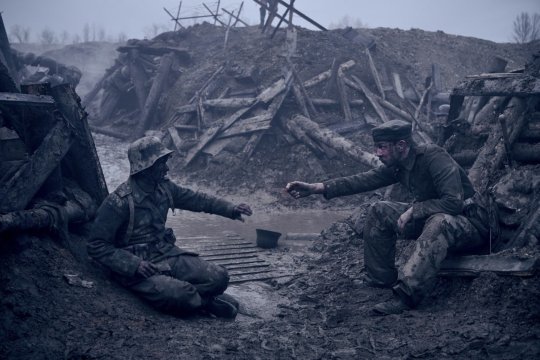
All Quiet on the Western Front (2022, Germany)
As a film buff, I retain a preference to reading a book first before seeing its adaptation. But with how many movies I see in a year – sometimes not realizing that a movie is a literary adaptation before starting it – and given how many original source materials are out-of-print or little-read (let alone how slow a reader I am), this is often too difficult a proposition. I make an attempt, however possible, to learn about the themes of an adapted book I was not able to read before heading into a film write-up. Strict fidelity to the text is not a requirement; yet a film adaptation should adhere to the spirit of the text. Any significant changes to that requires the change be done with artistic intelligence and sensitivity. Especially when the adapted book in question is significant in a peoples’ or a nation’s consciousness. Published in 1929, All Quiet on the Western Front by Erich Maria Remarque is a landmark novel in anti-war literature and remains – for its depiction of World War I on the bodies and minds of the young men sent to fight it – an important part of modern Germany’s sociopolitical identity.
Lewis Milestone’s 1930 film adaptation at Universal with Lew Ayres was the first cinematic masterpiece following the introduction of synchronized sound and the era of the silent film. Now steps in Edward Berger’s German-language adaptation for Netflix, starring Felix Kammerer, in hopes of reminding viewers that Im Westen nichts Neues (roughly “Nothing New in the West”) is, despite its universal appeal, fundamentally a German story. Berger’s All Quiet is a stupendous technical masterpiece – harrowing visual and sound effects, overflowing with blood and mud. It is among the most technically accomplished war movies this side of Saving Private Ryan (1998). Along the way, Berger’s All Quiet tries for too much, and betrays the characterizations and the intent of Remarque’s novel. With some of its violent scenes shot too aesthetically pleasing alongside an offensive and disrespectful electronic score, 2022’s All Quiet casts the French civilians and soldiers as “the enemy” rather than fellow victims. It veers perilously close to fetishizing the violence within.
Before a brief synopsis, it seems appropriate to reproduce Remarque’s epigraph to All Quiet on the Western Front here:
This book is to be neither an accusation nor a confession, and least of all an adventure, for death is not an adventure to those who stand face to face with it. It will try simply to tell of a generation of men who, even though they may have escaped shells, were destroyed by the war.
It is 1917, and the Great War has been plodding along for three years. Along with his friends Ludwig Behm (Adrian Grünewald), Albert Kropp (Aaron Hilmer), and Franz Müller (Koritz Klaus), student Paul Bäumer (Kammerer) enlists in the Imperial German Army. They all receive uniforms that, unbeknownst to them, belonged to German soldiers killed in action. Skipping almost entirely over basic training, Paul and his friends deploy to the Western Front, on the French side of the Belgium/France border. There, they befriend Stanislaus “Kat” Katczinsky (Albrecht Schuch) and Tjaden Stackfleet (Edin Hasanovic), who are several years older and have been fighting since close to the war’s beginning. These young men muddle on in drenched trenches, freezing weather, and their comrades’ horrific deaths. Parallel to the plight of Paul and his fellow soldiers is German politician Matthias Erzberger (Daniel Brühl), who secretly travels by train to the Forest of Compiègne to negotiate with French General Ferdinand Foch (Thibault de Montalembert) an armistice.
Also featuring in this film are Devid Striesow as the so-villainous-he-must-be-a-moustache-twirler General Friedrichs, as well as Andreas Döhler and Sebastian Hülk as two German officers.
This All Quiet on the Western Front occasionally frames its violent scenes as too painterly, the combat infrequently choreographed too closely to action movies (e.g., 2017’s Dunkirk is sometimes more of a suspense movie than it is a war movie and Sam Mendes’ 1917 from 2019 is an aesthetic challenge and action movie first, war film second). The opening moments are a dolly shot that linger over a patchwork of corpses strewn about No Man’s Land, with the dull rattle of machine gun fire occasionally disturbing the soil. There is an almost gawking approach to how cinematographer James Friend hovers over the bodies. One character’s death is shrouded in a blinding angelic light – applying too picturesque a technique for a non-fantastical moment. Some exceptions to this voyeuristic, perhaps fetishistic approach to framing warfare appears, including the frightening emergence of French tanks through a cloud of gas. Berger succeeds in displaying war for all its brutality. The film’s sheen, however, comes off as too aggressive and its camerawork reflecting a Netflix-esque polish.
The most glaring misstep from the screenplay by Berger, Ian Stokell, and Lesley Paterson is to include any perspectives not involving Paul and his most immediate comrades. Depicting the insights of Erzberger, Foch, and the fictional General Friedrichs removes one of the central pillars of why All Quiet on the Western Front was such a revolutionary piece of literature. Remarque’s novel, at a time when “anti-war” narrative art was in its infancy, was one of the first war narratives that concentrated entirely on common soldiers – not the officers that commanded them or the politicians that guided them.
Before focusing on Paul and his friends, let us get the officers and politicians out of the way first. The insertion of the armistice negotiations and Gen. Friedrichs’ beliefs over politicians selling the Germany army out – more on this fiction shortly – stunts Paul and his friends’ respective character growths. And despite a decent performance from Brühl, these scenes (except for the final time the elite appear) play out repetitively: Erzberger pleads to Foch for a ceasefire, Foch demands a conditional surrender that will heavily punish Germany, and Erzberger mulls over the terms of surrender. This is all distracting from the common soldiers’ experiences, and provides as much cinematic or educational value as an amateur historical reenactment.
Berger’s stated justification for including these scenes – and letting them drag on too long in the film’s second half – is reasonable. Over the last decade, the actions of far right political groups in Germany have become more visible. These contemporary groups espouse the myths that some in 1920s and ‘30s Germany used to justify the nation’s actions leading up to World War II – all which monolithized and exploited German WWI trauma to serve repugnant purposes. The emotional imbalance of the Erzberger*/Foch scenes paints France and the Allies as an unforgiving “other”, as well as the war’s eventual “victors” (the Allies did prevail in WWI, but Remarque sees no winners in warfare). For a work never meant to be an accusation and written in between the World Wars, the proto-fascist Gen. Friedrichs spits out an early form of the stab-in-the-back conspiracy theory‡. His behavior and appearance, eerily reminiscent of Allied propaganda of Germans as “the Hun”, casts him as the film’s obvious villain. These decisions all provide Berger’s All Quiet with a juxtaposition of morality more appropriate in a WWII movie than one for the Great War.
Beyond the implications of historical morality, Berger, Stokell, and Paterson’s screenplay undermines, at almost every juncture, Remarque’s critiques of the nationalism that began World War I. The decision to have Paul and his friends join the military in 1917 rather than 1914 (as it is in the book) makes it more difficult to have Paul and his friends to have conversations about the nature and the origins of this war. Instead, the screenplay keeps such dialogue to a minimum. As a result, Berger relies on cinematographer James Friend (in his first motion picture of note) to show us close-ups of Paul’s face to reveal his thoughts. In his film debut, Felix Kammerer is doing all he can with his facial and physical acting, but after a certain point this take on Paul results in him being an empty vessel.
Indeed, in Remarque’s book, Paul Bäumer is very much a reactive rather than proactive character. But that does not mean he is without deep introspection, as he is in this 2022 adaptation. Rather than someone who slowly realizes the nationalistic folly of WWI (“We loved our country as much as they; we went courageously into every action; but also we distinguished the false from true, we had suddenly learned to see.”), muses on how wars begin, and is anything but resigned to war’s inevitability, Kammerer’s Paul emotes and says nothing about these aspects of the war. Any critique from nationalism comes not from Paul in this adaptation, but from Gen. Friedrichs’ cartoonishly villainous behavior and Paul’s teachers in the film’s opening minutes. Paul and his friends are no battlefield geniuses, nor are they intellectuals. But the monotony of war – in the absence and presence of violence – grants them knowledge no classroom can give, wisdom that no elder can impart.
Berger, Stokell, and Paterson have the gall to delete entirely arguably the most critical passage in the book: Paul’s return home after being granted time for rest and recreation. After a lengthy spell fighting in the trenches, Paul’s leave completes his development as a naïve and adventure-seeking student to a detached, disillusioned man. Nationalism manipulates his father and others – mostly older men – into believing the justness of the conflict, that serving one’s country in warfare is glorious.
By contrast, Lewis Milestone’s 1930 adaptation takes Paul’s reunion with his teacher a step further than the book. In that version, instead of a chance encounter at a parade ground, Paul visits his teacher during class, with his newest students a rapt audience. The scene that follows is not subtle. But in the context of Milestone’s adaptation, the film earns it. As Paul, Lew Ayres refuses to gift his former teacher the heroic narrative he requests – paraphrasing Horace, decrying nationalism, and simply stating: “We try not to be killed; sometimes we are. That’s all.” One figures these are the words, delivered in sullen fury, by WWI’s veterans. Berger’s adaptation again leans too heavily on Kammerer to relate any semblance of the above ideas. There is no analogue scene to juxtapose the behavioral and psychological differences between battlefront and homefront, no character or even a faraway figure for Paul to verbally challenge. Kammerer’s Paul does undergo a behavioral and cognitive shift by the conclusion of 2022’s All Quiet. Yet, his transformation is not nearly as dramatic as the narrative needs it to be. These failures all stem from a screenplay that might as well have been titled something else. It is damningly incurious about Paul and his friends.
Major movie studio film scores are moving in a particular direction: amelodic, electronic, experimental, metallic, and minimalistic. It seems, by how awards voting bodies and audiences are reacting to such music, what I am about to write paints me more of an outlier than ever.
Composer Volker Bertelmann (also known as his stage name Hauschka; 2016’s Lion) concocts an anachronistic score that includes all these elements. Devoid entirely of recognizable melody (droning strings), Bertelmann’s score has one repetitive three-note idea – I refuse to call this a motif, as it lacks any sense of development from its first to final appearances – that damages and dominates the movie. Inserted in strangely timed moments and meant to intensify dread, Bertelmann’s idea begins from the root note (B♭), up a minor third (D♭), then descends a minor sixth (F). Bertelmann plays these three notes fortissimo, with synthesizer mimicking blaring brass – trust me, you know the sound and you may know its worst practitioners. When recurring underneath the strings, the idea modulates. Memorable as it may be, this metallic sound is more appropriate for hyping young men before a battle or at a rave rather than suggesting dread. Even worse: this is disruptive music. There is a healthy balance to when music should or should not accompany the imagery onscreen. One should notice music in a movie, and it should empower – but not completely overshadow – the emotions and ideas in respect to a certain scene. Bertelmann’s interruptions appear mostly in calms before the proverbial storms. These are the moments the characters and the audience should collect themselves before the killing restarts. Thus, his three-note idea abuses and instantly overstays its welcome.
Is there a place for such colorless, obnoxious, and offensively manipulative music in film? Certainly. Just not in anything entitled All Quiet on the Western Front.
On its surface, a German-language film adaptation of All Quiet on the Western Front would restore a cultural and linguistic authenticity to Remarque’s text, one of the most important literary works in German history. To some extent, Berger succeeds. His All Quiet is a technical wonder, but its human interest is nil. Remarque’s prose is not the most accomplished, but his subjective descriptions of trench warfare and his characters’ philosophizing in moments of boredom and quiet were unlike anything almost any Western reader ever encountered. We, the readers, grow alongside Paul and his friends. In 1930, the viewers saw a small group of friends – Milestone’s adaptation is unique in that Paul does not truly emerge as the main character until halfway through the film – see their youth and optimism pummeled away with each shelling and charge. A humanity remains, but tenuously. Berger’s adaptation treads an easier path by inserting a reenactment of the armistice negotiations and expediting Paul’s characterization by immediately dismantling his inwardness and sense of hope.
As a document of a generation’s experiences, a critique of that era’s nationalism that led to the conflict, and a common soldier’s processing of the war’s origin and purpose, this is a poor adaptation of Remarque’s novel. It clears the hurdle in anti-war narratives by decrying warfare as ugly. Beyond this basic expectation, it accomplishes little else.
My rating: 6/10
* Erzberger was assassinated by the far-right terrorist organization Organisation Consul (OC) in 1921. The group was disbanded the year after, but its former members were absorbed into the Nazi Party’s Schutzstaffel (SS).
‡ This conspiracy theory was primarily associated with Jews, but the Nazis also extended it to the political elite that negotiated the surrender. And as if it weren’t obvious enough, one of our German characters is stabbed in the back in the film’s concluding minutes.
For more of my reviews tagged “My Movie Odyssey”, check out the tag of the same name on my blog.
#All Quiet on the Western Front#Im Westen nichts Neues#Edward Berger#Felix Kammerer#Albrecht Schuch#Daniel Brühl#Aaron Hilmer#Moritz Klaus#Adrian Grünewald#Edin Hasanovic#Thibault de Montalembert#Devid Striesow#James Friend#Sven Budelmann#Volker Bertelmann#Hauschka#Lesley Paterson#Ian Stokell#Netflix#My Movie Odyssey
15 notes
·
View notes
Text
‘All Quiet On The Western Front’ Movie Trailer
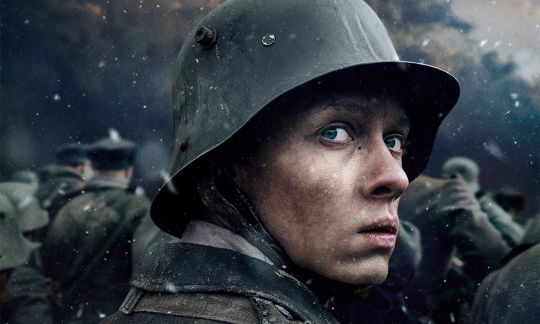
Netflix has released the official trailer for All Quiet On The Western Front, Germany’s official country selection in the Best International Feature Film category at the 2023 Oscars.
Directed by Edward Berger, the film is a new take on the classic 1929 novel by Erich Maria Remarque. The trailer opens with a quote from the novel, which sets up the film’s premise, “We have so much to say, and we shall never say it,” signaling a promise to “show the true face of World War I.” The book was also the source material for the eponymous 1930 Best Picture Oscar-winner.
The film tells the story of a young German soldier, played by Felix Kammerer, on the Western Front of World War I. Paul and his comrades experience first-hand how the initial euphoria of war turns into desperation and fear as they fight for their lives, and each other, in the trenches. Daniel Brühl, Sebastian Hülk, Albrecht Schuch, and Anton von Lucke also star.
Maria Remarque’s anti-war classic gets its first German-language adaptation for the screen, after the Hollywood versions of 1930 and 1979; it’s a powerful, eloquent, conscientiously impassioned film from director and co-writer Edward Berger. Newcomer Felix Kammerer plays Paul, the German teenage boy who joins up with his schoolfriends in a naive patriotic fervour towards the end of the first world war, excitedly looking forward to an easy, swaggering march into Paris. Instead, he finds himself in a nightmare of bloodshed and chaos.
All Quiet On The Western Front boasts a large cast of some of Germany’s leading actors. Daniel Brühl plays real-life anti-war writer and diplomat Matthias Erzberger. US viewers will recognize Brühl from his countless film and series roles, with notable appearances in The Falcon and The Winter Soldier, The Alienist, and The King’s Man. He also appeared in The Bourne Ultimatum, Inglourious Basterds, and Captain America: Civil War.
Austrian newcomer Felix Kammerer turns in a star-making performance as the young Paul Bäumer, who goes from unbridled euphoria to abject terror after witnessing the brutal deaths of his friends and being assigned the task of collecting their dog tags. Bäumer becomes a close friend of Stanislaus “Kat” Katczinsky, played by Albrecht Schuch, an illiterate cobbler whose wife’s letters are read to him by Bäumer. The cast also includes Moritz Klaus, Aaron Hilmer, Edin Hasanović, Adrian Grünewald, Devid Striesow, Andreas Döhler, Sebastian Hülk, Alexander Schuster, Luc Feit, Michael Wittenborn, Michael Stange, André Marcon, Tobias Langhoff, and Anton von Lucke.
All Quiet on the Western Front is released on on 28 October on Netflix.
Read the full article
0 notes
Text
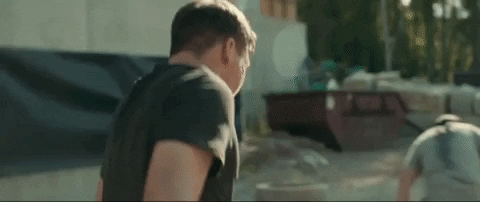

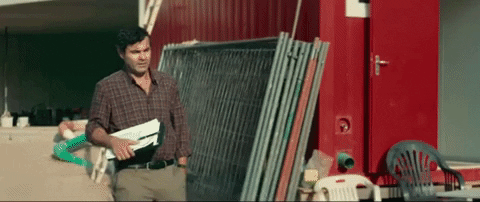

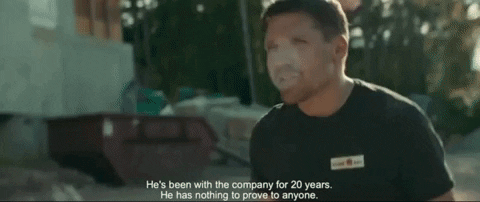

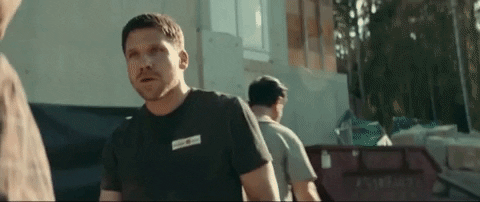
Check the review here 👇👇
Her new movie follows a family of three, composed of Rainer Matschek (a majestic Hanno Koffler, co-writer on the film together with the director), who works for a construction company and has recently been appointed site manager for an important project; his caring wife Nadine (Anna Blomeier); and their 13-year-old daughter Doreen (Dora Zygouri). The family has recently moved into a little house in the outskirts of the town, owing to rising rents and in order to make ends meet, and the new work project he’s been assigned may be the much needed big break that Rainer's career needs. Two crucial events begin to shake up the family's frail balance. First, Doreen makes friends with her neighbour, Mara (Lilith Julie Johna), a girl of her same age from a rich family, who incites her to play some nasty tricks and involves her in a theft at a convenience store. Second, Rainer is unexpectedly demoted by his boss Klose (Robert Stadlober) and forced to leave his post to Kleemann (a marvellously hateful Andreas Döhler), an unscrupulous supervisor ready to exploit his manpower day and night for the sake of maximising profits. As the two conflicts escalate, we are helpless witnesses to the family's unavoidable collapse. Rainer and Doreen are pushed to their limits and keep on “biting the bullet,” while their two enemies find ways to make their lives impossible. The constant feeling of powerlessness is not too different from the one experienced when watching Ken Loach's drama Sorry We Missed You [+]; here, too, the head of a family must fight against his tyrannical employers and the spiral of small and big misfortunes hitting the characters seems unstoppable. The growing tension is also felt through the film's increasingly fast narrative pace, which in later stages becomes rushed and anguishing. The cinematography, courtesy of Falko Lachmund (Sisters Apart [+]), ties in wonderfully with Meyer's poetic of social realism, and does not hesitate to show the ugliest and most depressing room corners, shabby interiors, Rainer's unkempt look, the rust and the dirt. The final showdown is timely, cruel and meaningful, as it offers a wider – and even more disillusioned – perspective on the role of victims and perpetrators as well as on the process of dehumanisation caused by labour exploitation and bullying. On the whole, the Braunschweig-born director does a great job in tackling these overused themes, choosing to place her trust on excellent leads and dry dialogues.
#hanno koffler#german actor#review#berlinale#hanno koffler gifs#hannokoffler#people: hanno koffler#german cinema#celebrities#actor#cinema#german actors#germany
5 notes
·
View notes
Text
Herr und Frau Bulle – Abfall - Der Samstagskrimi im ZDF
Herr und Frau Bulle – Abfall – Der Samstagskrimi im ZDF
ZDF und [m] KNSK; Foto: Tobias Schult Herr und Frau Bulle – Abfall Der Samstagskrimi
ZDF, Samstag, 2. Mai 2020, 20.15 Uhr
“Abfall” ist der dritte Fall für “Herr und Frau Bulle” und damit für das gegensätzliche Ehepaar Wills. Was hat sich verändert, inwieweit wirkt sich die Zusammenarbeit der beiden auf ihre Beziehung aus? (more…)
View On WordPress
#Alice Dwyer#Andreas Döhler#Birge Schade#Christopher Vantis#Fritzi Haberlandt#Hansi Jochmann#Herr und Frau Bulle#Johann von Bülow#Marie-Lou Sellem#Martin Otting#Nina Goceva#Samstagskrimi#Samuel Finzi#Stephan Bissmeier#Tim Kalkhof
0 notes
Text
Trailer: Die Einzelteile der Liebe
Trailer: Die Einzelteile der Liebe
©Arsenal Filmverleih
“Die Einzelteile der Liebe” ist eine ernsthafte Trennungskomödie von Miriam Bliese, in der sich Sophie (Birte Schnoeink) und Georg (Ole Lagerpusch) trennen, aber noch immer miteinander zu tun haben. Grund dafür ist Sophies 6-jähriger Sohn, der zwar nicht Georgs leibliches Kind ist, aber er hat ihn seit dessen…
View On WordPress
#Andreas Döhler#Berlinale#Birte Schnoeink#Blogger#Bloggerin#Brigitte Zeh#Cinema#Clemens Köstlin#Deutscher Film#dffb#Die Einzelteile der Liebe#Falk Rockstroh#Film#Film- und Fernsehakademie Berlin#Filmbloggerin#Filme#Filmkunst#Filmkunstfest Schwerin#Gina Dieu Armstark#Justus Fischer#Kino#Miriam Bliese#Movie#Ole Lagerpusch#Passion of Arts#Peter Weiss#Sophia Burtscher#Spielfilm#Tobias Kasimirowicz#Trailer
0 notes
Text
Royal TV with Jördis Triebel (Ludovika, The Duchess in Bavaria) continues behind the scenes of The Empress (2022).
This time with Andreas Döhler as Maximilian, The Duke in Bavaria.
#The Empress#the empress (2022)#die kaiserin#costume drama#historical drama#period drama#Jördis Triebel#Andreas Döhler#ludovika in bavaria#ludovika of bavaria#maximilian in bavaria#german series#german tv#behind the scenes#netflix
6 notes
·
View notes
Text
No

No [trailer]
Dina, an actress, and Michael, a doctor, struggle to balance their relationship with their responsibilities as parents and fears of unemployment.
You have to make it through the wedding speech near the beginning, which seemed to never end, and during which I almost stopped watching. After that, still not all episodes are hits, but the amusing ones are clearly in the majority (for example, the ultrasound exam, the hospital as a war zone, the operating room, the funeral).
Formally, the episodes often use fixed camera positions during an episode. They are not as meticulously designed as scenes in movies of Swede Roy Andersson. But I think they are meant as an homage, and have the advantage of being livelier and less depressing than his.
#No#Nö#Dietrich Brüggemann#Anna Brüggemann#Alexander Khuon#Isolde Barth#Hanns Zischler#Andreas Döhler#Mark Waschke#Petra Schmidt Schaller#Felix Goeser#foreign#Germany#recommended
1 note
·
View note
